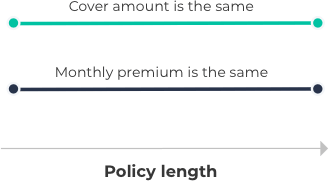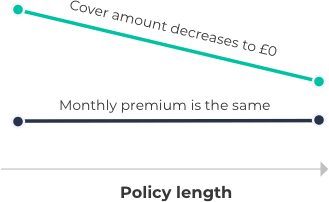Have peace of mind with life insurance
- £200k cover for less than £6 a month*
- Your premiums will never increase
- Single and joint policies available
What is life insurance?
Life insurance is a policy to protect your family and dependants’ financial security by leaving them a lump sum if you pass away.
With Beagle Street you are insured from the moment you purchase your policy, meaning you will have the peace of mind that those you care about most will be looked after.
This will help them continue their lives once you are gone and protect the legacy you were building for them.


How does life insurance work?
Life insurance pays out a lump sum when you die so you know those you leave behind can be financially secure. You can select the cover amount and policy duration based on your unique circumstances and what you’re looking to protect.
Some of our customers choose policies just to cover their mortgage to ensure their family could keep their home if you died, this is called decreasing term cover. Others prefer to leave a cash sum to give their children a good start in life without them, this is called level term cover.
There’s not a one size fits all approach to life insurance, that is why we give everyone the choice to tailor their cover amount and policy duration based on what you want to protect.
Why should I take out life insurance?
Everyone has their own reasons for taking out life insurance, but typically it is because they have someone who would be financially impacted by their death. This could be used for:
Paying for your home is often the biggest debt in your life. Life insurance can help to pay off your mortgage or cover your rent, to ensure your family could keep your home if you died.
Upon your death, your family will be left with unexpected expenses such as funeral costs. Life insurance can cover these costs and provide your loved ones peace of mind.
If you have any debts or joint loans that your family would need to cover if you died, they can be paid off with your life insurance.
If your family would struggle to pay the bills without your income, life insurance can protect your loved ones and ensure the essential expenses are covered.
Get a quote today or speak to the team
or call us
At Beagle Street we’re here to support you through the application process. If you’re ever unsure about any of the questions in the application, we have a team of experts on hand to help.
Included with every Beagle Street policy
Estate Planning Kit
Accidental death benefit
Early funeral payout
Amazon Gift Card^
Free Beagle Soft Toy^
Level term
Level term life insurance pays out a fixed amount of money upon death that never goes down. This means you know exactly how much your loved ones would receive if you were to pass away.
The payout and premiums are decided at the start of the policy and never change, so you can be sure about your premiums in life and how much your family will receive in death.

Decreasing term
Decreasing term life insurance is a policy designed to cover large debts such as a mortgage. The amount of cover decreases over the course of the policy as you pay your mortgage off and this debt therefore decreases.
These policies are more affordable than level term policies but could ensure your families biggest assets are protected.

Should I get a single or joint policy?
A single life insurance policy only covers the policy holder and will therefore only pay out if they die, whereas joint life insurance covers a second person under the same policy.
A joint policy is typically cheaper than two separate policies although you can only make one claim on the policy. These are suitable for several circumstances such as a mortgage, shared debt or responsibility.
Some couples prefer to have two single life insurance policies, which ensures the surviving partner still has cover after the first death. These policies are more common where there is a child or dependent.

How much does life insurance cost?
Our premiums vary depending on the length, type of policy and amount of cover you need as well as your personal circumstances such as age, health and lifestyle.

How long does a claim take?
Once a claim has been approved the money will be transferred within a few days if a trust is in place. However, if there’s no trust it will have to go through probate which can take a lot longer.
To help with the immediate financial impact of your passing, Beagle Street offer an early funeral payout which provides an advance of up to £5,000 to cover the cost of the deceased’s funeral if your pay out is delayed in probate. This will help relieve some immediate financial burdens for your loved ones.
Do I need to plan for my death?
Although it’s not exciting, putting your end of life affairs in order will really help support your family and take away the stress of working out what to do with your estate. That’s why Beagle Street provide an estate planning kit to help all of our customers.
Will writing service
All our policy holders can write a free simple will through one of our regional partners.
A simple will is a will that leaves an estate to a maximum of six beneficiaries without the use of trusts or tax planning. Without a will in place, it’s not always clear who you wanted to leave your estate to so it’s important to have one.
Policy in trust
Putting your policy in trust may also help avoid a potential tax bill if the value of your estate is greater than £325k
Using our free trust tool to put your policy into trust means we can pay out your policy without having to go through probate. As such your family will receive their payout much sooner.
Legal advice
All Beagle Street policies include an hour of free legal advice. Our legal partners are on hand if you have any questions about estate planning or inheritance laws. They’ll even help with any other legal questions or queries you may have.
Get a quote today or speak to the team
At Beagle Street we’re here to support you through the application process. If you’re ever unsure about any of the questions in the application, we have a team of experts on hand to help.
or call us
0800 048 0480
Included with every Beagle Street policy
Estate planning kit
Accidental death benefit
Early funeral payout
Amazon gift card^
Free Beagle soft toy^

Does life insurance actually pay out?
As long as you answer all the questions honestly and accurately, we will pay out a life insurance claim. The only exclusion is suicide within the first 12 months of the policy start date. Remember, if your health changes after you have taken out the policy, then don’t worry, the price won’t change, and we will still pay out.
Are you eligible for life insurance?
Most people who apply are able to get cover for their needs, just make sure you answer all the questions truthfully when you apply. You are eligible to apply if:
- You are currently a UK resident
- You are at least 18 years old

Get a quote today or speak to the team
At Beagle Street we’re here to support you through the application process. If you’re ever unsure about any of the questions in the application, we have a team of experts on hand to help.
or call us
0800 048 0480
Included with every Beagle Street policy
Estate planning kit
Accidental death benefit
Early funeral payout
Amazon gift card^
Free Beagle soft toy^
*Based on a 30 year old non-smoker, £200k decreasing term cover for 20 years
**Beagle Street is underwritten by Family Assurance Friendly Society Limited, who in 2023 paid out 99.8% of all protection claims
^Available only when purchasing a policy directly through Beagle Street. Within 60 days of paying the 2nd monthly payment, the soft toy will be dispatched. The gift card value varies depending on monthly premium. Within 30 days of paying the 6th monthly payment, you will receive an email to claim your e-gift. Full Terms and Conditions



